#pp: excerpt
Explore tagged Tumblr posts
Text
Good Lines Tag
Oh my god I'm so late on this but thank you for the tag, @mariahwritesstuff!
Tagging @archivistverity @withlovelunette @sheabutterskyes @juls-writes
Rules: What's a line that you're tremendously proud of writing, and what's a line that's just out-of-context ridiculous?
Proud, from Where Paradise Died and Lived
The path opened up to a wide pasture. It would have been identical to all the other fields Sophie had seen in the past few days—a vast canvas of wild grass bracketed with towering trees that infused the air with that fresh scent of pine Sophie had come to love—except this field was alive. Scattered across the grass was a series of yellow twinkling Sophie had never seen before. They melted in and out of the dark expanse like sparks of a candle dissolving into smoke, flitting back and forth as they rose higher and faded into nothingness. There were dozens of them, disappearing as quickly as they reappeared somewhere else. Fireflies, Sophie thought somewhere in the back of her mind. She had read about them in books before, but there were none of them in Hawaii. Now that they were in front of her, she didn’t want to look away even for a moment. How strange that something so small could create a sight so mesmerizing. Sophie had only ever known one other comparable sight, and that was when she had driven out to Hanauma Bay with her father to observe the Milky Way in her second year of high school. She remembered that night well; it was difficult to forget the acute sense of insignificance one felt when standing under what seemed like all of the cosmos. Now in a strange manner, Sophie felt the opposite. The universe was not an unreachable, incomprehensible infinity here. It was right before her then, surrounding her so she could have touched its marvels with her hand, if she had been quick enough to catch one. Not at all removed from its awesomeness, she was actually within it—part of it. The sky had fallen to the earth, and far from it being the end of the world, Sophie could only think of how lucky she was to be in a place so wondrous. If the place had been filled with fairies, she would have felt the same sense of magic.
Ridiculous, from Poco a Poco:
The car stopped in Ueno and Rika unbuckled her seatbelt. "Um, thank you for the hospitality. I really appreciate it." "Consider a favor for your attendance at the concert," Masahiro said. "Good day." It was a generous favor, Rika thought, but she didn't say anything beyond, "See you on Monday." She clambered out of the car and made to go inside Ueno— But she stopped when she realized a small crowd of people had gathered on the sidewalk, all of them staring at her. The expressions on her classmates' faces ranged from awestruck to suspicious. Instinctively, Rika looked behind her to see if they were perhaps taken by something else, but there was nothing there beyond a bench and a stretch of grass. "What is it?" she said defensively. No one spoke. Squaring her shoulders, Rika shouldered her purse and pushed through the throng, determined to ignore the sea of faces that she could feel on her back. What's with them? It was not until she was alone in the elevator that she realized— They had all seen her emerge from the personal car of Masahiro Fujiwara, the most popular and admired student on campus.
5 notes
·
View notes
Text
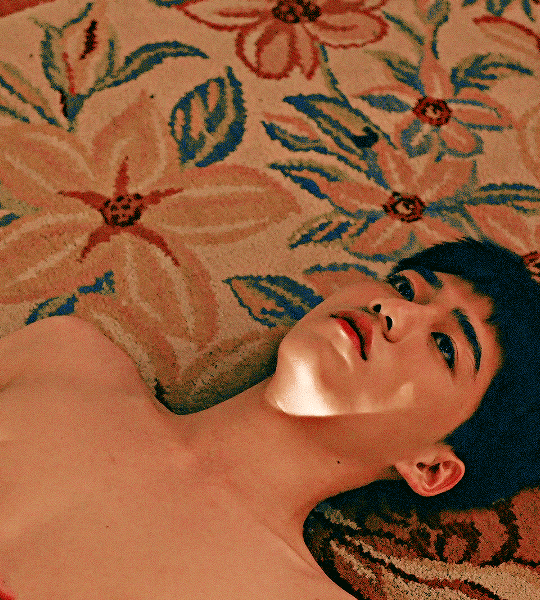





☼ I TOLD SUNSET ABOUT YOU, ep 4
↳ This feels good. I don't have to think about anything. Mmmm. I wanna keep staying this way. I love the way the seawater touches my back. It feels like something is holding me up. But you need to hold your breath all the way to stay like this. It can get uncomfortable.
#just realized what they were rlly talking about in that floating scene excerpt#foreshadowing the layers the layers#another day another new ITSAY revelation#fuck this show#itsay#i told sunset about you#oh-aew#oh aew#oh aew my beloved#teh x oh aew#pp krit#billkin putthipong#cgedits#mygifs#thai bl#thailand#phuket#thai drama#asiandramasource
34 notes
·
View notes
Text
Australie
Excerpts from the article in the Sydney Telegraph, Saturday 6th June, 1997, pp 38-39. It contained an interesting interview with John Pope, Jeff's Australian tour manager, and Donny Ienner, Head of Columbia Records. (thanks to Christine Warren)
THE LAST GOODBYE Music writer Dino Scatena examines an ironic finale.
The tragic details of Jeff Buckley's final few moments read like an overly dramatic draft for one of the artist's video clips. The imagery could have served as a perfect visual counterpart to his most famous song, Last Goodbye. A carefree Buckley, laughing and singing as he walks fully clothed into the Mississippi River, floating on his back until the water's swirling hidden life-force rises to hug his fragile frame and lead it into eternity. Les détails tragiques des derniers moments de Jeff Buckley sont comme un brouillon extrèmement dramatique d'un clip vidéo de l'artiste. L'image aurait pu servir de parfait équivalent visuel pour sa chanson la plus célèbre : Last Goodbye. Un Buckley insousciant, riant et chantant comme il va tout habillé dans le Mississipi, flottant sur le dos jusqu'au moment où la force vitale cachée dans l'eau tourbillonnante s'élève pour étreindre sa fragile charpente et la conduire dans l'éternité.
Buckley would have hated such a storyboard; too cliched, too grandiose. The 30-year-old singer/songwriter always strived to make his work uncluttered, simple, its power left to be carried through the innate beauty of his poetry and pure angelic voice. Buckley aurait détesté un tel story board ; trop cliché, trop grandiose. Le chanteur/songwriter, âgé de 30 ans, s'est toujours efforcé de désencombrer son travail, simple, son pouvoir se laissait porter par la beauté innée de sa poésie et de sa voix pure et angélique.
The extraordinary circumstances surrounding the death of Jeff Buckley has once again sent a generation of rock fans around the world into deep mourning. It's an all too familiar tale: an artist with a seemingly mystic gift, a tortured and tormented soul whose presence is whisked away from us before its full potential is realised. Les circonstances extraordianaires entourant la mort de Jeff Buckley a plongé à nouveau une génération de fans de rock du monde entier dans un deuil profond.
(...)
As it's turned out, Buckley was only on this world long enough to release a single album, Grace will remain one of the most astonishing and well-rounded debuts of the modern rock age. Vu la tournure des choses, Buckley a été dans ce monde seulement assez longtemps pour sortir un unique album, Grace restera un des premiers albums les plus étonnants et les mieux tournés du rock de l'âge moderne.
Of course, all the tragedy surrounding Buckley's passing is compounded by the fact that his father, Tim Buckley, met a similar premature end. Tim Buckley, who many still hail as the most original folk singer of his generation, died of a drug overdose in 1975 at the age of 28. Bien sûr, toute la tragédie entourant le décès de Buckley est constituée du fait que son père, Tim Buckley, eut également une fin prématurée.Tim Buckley, que beaucoup proclament encore comme le plus original chanteur folk de sa génération, est mort d'une overdose de drogue en 1975 à l'âge de 28 ans.
I lost myself on a cool damp night I gave myself in that misty light Was hypnotised by a strange delight Under a lilac tree (Lilac Wine)
Jeff Buckley's two visits to Sydney left an enduring impression. He came twice within six months, first in August of 1995 and then in February of last year. That first brief trip came on the back of an extended European tour. "I was getting tired of it in the last moments of playing in Europe, but it's entirely new here and I've had time to convalesce," he told a reporter on arrival. Les deux passages de Jeff Buckley à Sydney ont laissé une impression durable. Il est venu deux fois en 6 mois, d'abord en août 1995 puis en février de l'année dernière. Ce premier et bref voyage venait derrière une grande tournée européenne. "Je commençais à fatiguer les dernières fois où j'ai joué en Europe, mais c'est entièrement nouveau ici et j'ai eu le temps de me remettre", dit-il à un reporter à son arrivée.
Over the next few days, he gave two unforgettable performances: one at a small club called the Lounge in Melbourne and the other at Sydney's Metro nightclub. To those present, the Metro show on August 28 rates as one of the greatest musical performances ever witnessed in this city. In a magical 90 minutes, Buckley and his three-piece band delivered a remarkable set of light and shade featuring much of the Grace album as well as the aggressive covers of MC5's Kick Out the Jams" and Big Star's "Kangaroo". Buckley's pure, acrobatic voice sounded all the more extraordinary in the flesh. "You could hear a pin drop," recalled tour manager John Pope. "He held the audience in the palm of his hand. He'd take you on the ride with him. He'd lift you and take you down. He paced his gigs with finesse. When he walked on to a stage, he felt a responsibility, but it wasn't to the audience. It was to something else. God knows what." Les neuf jours suivants, il donna deux performances inoubliables : une dans un petit club appelé "the Lounge in Melbourne" et l'autre au Sydney's Metro nightclub. A ceux qui étaient présents, le show du Metro en août demeure une des plus extraordinaires performances jamais vue dans cette ville. En 90 minutes magiques, Buckley et les trois autres membres du groupe offrèrent un remarquable set de lumères et d'ombres jouant la plupart des chansons de l'album "Grace" comme des reprises agressives de "Kick Out the Jams" des MC5 et de "Kangaroo" de Big Star. La voix pure et acrobatique de Buckley sonnait le plus extraordinairement possible dans la salle. "Vous pouviez entendre une mouche voler" rappelle le tour manager John Pope. "Il tenait le public dans la paume de sa main. Il vous emmenait faire le voyage avec lui. Il vous levait et vous reposait. Il dosait ses shows avec finesse. Quand il montait sur scène, il sentait une responsabilité, mais pas envers le public. C'était autre chose. Dieu sait quoi."
"There was high anticipation which was rewarded 10-fold when he played, added Jen Brennan, manager of teh night's local support act Crow. "He just moved a lot of people. It was quite extraordinary. It's not often that you get a crowd at the Metro that's so silent and still. It was serene and very powerful." "Il y avait une grande anticipation qui avait été 10 fois récompensée quand il a joué", ajoute Jen Brennan, manager du Crow."Il a touché un grand nombre de personnes. C'était vraiment extraordinaire.Ce n'est pas souvent qu'on voit une foule au Metro qui soit si silencieuse et si calme. C'était serein et très puissant."
Indeed a couple of nights later at the Lounge show in Melbourne, the venue's management found it necessary to turn off the cash registers because their collective clanging messed with the ambience. De fait, deux nuits plus tard au Lounge show de Melbourne, le management trouva nécessaire de fermer les caisses enregistreuses parce que leur bruit collectif cassait l'ambiance.
That first visit was meant to be a simply a quick promotional trip to push Grace, but such was the impact of the Metro show that Buckley was persuaded to return to Sydney and play two extra gigs at the Phoenician Club to quench the city's sudden fascination with him. Cette première visite était censée être simplement un rapide voyage voyage promotionnel pour pousser Grace, mais l'impact au Metro show a été tel qu'on a convaincu Buckley de revenir à Sydney et de jouer deux nouveaux shows au Phoenician club étancher la soudaine fascination de la ville envers lui.
Within a few days of arriving, Buckley was gone. But he'd loved his time here and promised to return as soon as he could. Buckley kept his word and was back in February for a full-scale national tour. Peu de temps après son arrivée, Buckley était parti. Mais il avait adoré le temps passé ici et avait promis de revenir aussi vite que possible. Buckley tint parole et était de retour en février pour une tournée nationale.
It was now two years since the release of Grace and the pressures of life on the road as a high-profile recording artist were starting to show. "The whole Grace period has just been madness," he told the Daily Telegraph at the time. "I had no idea how completely crazy in the head I was until I came back and touched ground. I lost a lot of blood out there, meaning some things fell apart, some things got stronger. I think maybe I sensed my life would be altered forever, but not in any of the shapes it has. It's just like having a child. You can plan on it for years and years and think about it and daydream about it but when it actually happens, the ripple it causes in your life is really transforming." Cela faisait maintenant deux ans que Grace était sorti et les pressions de la vie en tournée d'un artiste de studio commençaient à se faire sentir. "Toute la période Grace a été de la folie", disait-il au Daily Telegraph à ce moment. "Je ne me rendais pas compte que j'étais complètement fou dans ma tête jusqu'à ce que je revienne et que je touche le sol. J'ai perdu beaucoup de sang là-bas, je veux dire que des choses ont disparu, certaines choses sont plus fortes. Je crois peut-être que je sentais que ma vie serait altérée pour toujours, mais pas du tout dans le sens où elle l'a été. C'est juste comme d'avoir un enfant. Vous pouvez le planifier sur des années et des années et penser à ça et rêver à ça mais en fait quand cela arrive, l'onde de choc que ça cause dans votre vie et vraiment "transformante"."
Although that second tour may have been a bit flat on stage, Buckley was still in good spirits, the same free-wheeling reckless self. He had his girlfriend with him this time, a violinist named Joan from a band called the Dambuilders. There was a screaming match back at the band's hotel one night when one of Buckley's bandmates came back to his room to find the singer and his girlfriend had trashed the room and had sex in both beds. Another night when Joan's band was playing a show at the Annandale hotel, Buckley went down and took care of the light show. When the Dambuilders started trashing their own instruments at the end of the show, Buckley abandoned his lighting duites and ran up on stage and helped them do it right. Même si cette seconde tournée peut avoir été un peu plate sur scène, Buckley était toujours dans de bons esprits, le même personnage imprudent en roue libre. Il avait sa copine avec lui cette fois, une violoniste nommée Joan dun groupe appelé the Dambuilders. Il y eut une effrayante baguarre à l'hôtel du groupe une nuit quand une des roadies de Buckley revint dans sa chambre pour s'apercevoir que le chanteur et sa copine avaient dégueulassé la chambre et fait l'amour dans les deux lits. Une autre nuit quand le groupe de Joan jouait un show à l'hôtel Annandale, Buckley descendit et s'occupa des lumières. Quand les Dambuilders commencèrent à détruire leurs propres instruments à la fin du show, Buckley abandonna la lumière et couru sur la scène pour les aider à bien faire.
Friends all describe Buckley as a warm, loving, open soul but the singer was often apprehensive when first approached by strangers. John Pope, who as tour manager for both visits spent virtually every day with Buckley while he was in Australia, described how the artist might appear cold as ice at first and then suddenly swing to the other extreme. "Someone on the street might say:'Are you Jeff Buckley?'" Pope explained. "And one day he night say: 'No he's over there, I saw him just go around the corner.' Or sometimes he might go, 'Yeah, I'm him' or 'Leave me alone'. Then they might say something funny and he'd open straight up to them and talk to them like they're long lost friends. It went that way in personal life, business life and with people he'd never met before." Ses amis décrivent tous Buckley comme une âme chaude, amoureuse et ouverte mais le chanteur appréhendait souvent ses premières approches avec des étrangers. John Pope, qui en tant que Tour Manager pour les deux passages passa virtuellement chaque jour avec Buckley pendant qu'il était en Australie, décrit comment l'artiste pouvait apparaître froid comme de la glace au début puis soudainement aller vers l'autre extrème. "Quelqu'un dans la rue pouvait dire "êtes-vous Jeff Buckley ?"", explique Pope. "Et un jour il pouvait répondre : "Non, c'est par là, je l'ai vu juste tourner au coin." Ou parfois ça pouvait être "ouais, c'est moi" ou "Laissez-moi tranquille". Puis ils pouvaient dire quelque chose de drôle alors il s'ouvrait directement à eux comme s'ils étaient de vieux amis perdus de vus. C'était comme ça dans sa vie personnelle, professionnelle et avec des gens qu'il n'avait jamais vus avant."
Pope's fondest personal memory of Buckley came during the first trip. The singer was furious when he found out that his tour manager hadn't told him that it was his birthday. Buckley promptly organised a penis-shaped cake and presented it to Pope on stage in Melbourne before shoving his face in the gift. Pope holds dear a photo of the pait on stage together, Buckley covered in cake and smiling broadly. Le premier souvenir personnel de Pope concernant Buckley date du premier voyage. Le chanteur était furieux quand il découvrit que son Tour Manager ne lui avait pas dit que c'était son anniversaire. Buckley organisa sur-le-champ un gâteau en forme de penis et le présenta à Pope sur scène à Melbourne avant de pousser son visage dans son cadeau. Pope montre tendrement une photo de l'événement sur scène ensemble, Buckley couvert de gateau et souriant vaguement.
"I can imagine him doing exactly what he did," Pope offered in reference to the circumstances of Buckley's disappearance, recalling the time he tried to talk the singer out of going for a night swim at Coolangatta Beach. "From when I knew him, you'd say: 'You shouldn't do that Jeff.' And he'd go:'Nah, it'll be all right. Don't worry about it.' And off he'd go. He was carefree and easy-going like that about life. "There was an edge to him that comes with creative people. He was definitely touched. He'd have those moments of of madness like any artisitc person does. But there was no self-destructiveness in it at all." "Je peux l'imaginer en train de faire exactement ce qu'il a fait", Pope fait référence aux circonstances de la disparition de Buckley, rappelant le temps où il essayait de convaincre le chanteur de ne pas aller nager à Coolangatta Beach. "Tel que je le connais, vous auriez dit : "Tu ne devrais pas faire ça Jeff". Et il aurait répondu : "Bah, ça va aller. Ne t'inquiète pas de ça". Et il aurait été. Il était imprudent et insousciant comme ça avec la vie. "Il y avait un côté chez lui qui est lié aux gens créatifs. Il était définitivement atteint. Il avait ces moments de folie comme tout artiste en a. Mais il n'y avait pas d'auto-destruction là-dedans du tout."
They're waiting for you Like I waited for mine And nobody ever came. (Dream Brother)
Jeff Buckley only ever met his famous father once. He spent a week with Tim, who left his mother Mary Guibert only a week after she gave birth to their only child, in April of 1975 when he was eight. Two months later, his father was dead. The weight his father's shadow cast on his life was the primary reason it took Jeff so long to take the leap into the limelight. "I knew there would be [comparisons] from the time I was a small child," Jeff once revealed. "From the time that his manager started calling my house when I was six or seven. I found my grandmother's guitar and [the manager] started calling the house:'Has he written songs yet?' So I've been waiting and doing the maths in my head about the inevitable comparisons all my life. But I don't care." Jeff a seulement rencontra son célèbre père seulement une fois. Il passa une semaine avec Tim, qui quitta sa mère Mary Guibert seulement une semaine après qu'elle ait donné naissance à son unique enfant, en avril 1975 quand il avait 8 ans. Deux mois plus tard, son père était mort. Le poids de l'ombre de la personnalité son père sur sa vie fut la principale raison pour laquelle cela prit si longtemps à Jeff de sortir de l'ombre. "Je savais qu'il y aurait des comparaisons depuis que je suis enfant," révéla Jeff un jour. "A partir du moment où son manager a commencé à appeler chez moi quand j'avais 6 ou 7 ans. J'ai trouvé la guitare de ma grand-mère et le manager a commencé à appeler à la maison : "A-t-il déjà écrit des chansons ?" Alors j'ai attendu et fait le calcul dans ma tête à propos de l'inévitable comparaison toute ma vie. Mais je m'en fiche."
Buckley was never comfortable discussing his father, deeply resented the fact that he wasn't invited to the funeral. But in 1991, he made an unannounced appearance at a Tim Buckley tribute concert in Brooklyn and performed a moving solo version of his father's I Never Asked to be Your Mountain. "I both admired and hated it," the young Buckley said afterwards on the song written about his parents' relationship. "That's why I did it. It was something really private to me. I figured that if I went to the tribute and sang and paid my respects, I could be done with it." Buckley ne se sentait jamais à l'aise pour parler de son père, ressentant profondément le fait qu'il ne fut pas invité aux funérailles. Mais en 1991, il fit une apparition surprise à un concert hommage à Tim Buckley à Brooklyn et joua une version solo "bougeante" de la chanson de son père "I Never Asked to Be your Mountain". "Je l'admirais et la haïssais à la fois," disait le jeune Buckley après-coup de la chanson écrite sur la relation de ses parents. "C'est pour ça que je l'ai fait. C'était quelque chose de vraiment très privé pour moi. Je m'imaginais que si je venais à l'hommage et chantais et payais mes respects, je pouvais en être quitte".
It's night time coming I'm not afraid to die ... My love, now the rain is falling I believe my time has come It reminds me of the pain I might leave behind. (Grace)
Jeff Buckley signed to Columbia records home to the likes of Bob Dylan and Bruce Springsteen, in 1993 and soon after released the EP Live At The Sin(e). Jeff Buckley signa avec Columbia Records en 1993 à l'instar de Bob Dylan et Bruce Springsteen et peu après sortit le EP "Live at Sin-é".
In an exclusive interview with the Daily Telegraph yesterday, an emotional Donny Ienner -- head of Columbia Records and the man directly responsible for signing Buckley -- shared his reminiscences aof that early period. "I remember the first time I went down to see Jeff after a few people had told me about his performances at SINE, I was so taken that night by the depth of his artist. Of all the artists that I've ever personally signed, Jeff made the most immediate impact on my life. I felt that his reverence for the past, not to mention obviously the opportunites for the future, was incredible. He knew every record of Miles Davis and Edith Piaf and opera records and classical records and Led Zeppelin records. He was just such a great teacher of diverse music. He defies any sort of characterisation or trend. He had that at a very, very early age and the impact that he made on the world with just an EP and an album is going to be felt for decades to come. Jeff never worried about rock stardom, never worried about money, and never worried about the things that a lot of young artists worry about today. He was really worried about making sure his integrity was intact at all times. He was just an incredible thing." Dans une interview exclusive avec le Daily Telegraph hier, un Donny Ienner ému - patron de Columbia Records et l'homme directement responsable du contrat de Buckley - partageait ses souvenirs de cette récente période. "Je me souviens de la première fois que je suis venu voir Jeff après que quelques personnes m'aient parlé de ses performances au Sin-é, j'ai été si frappé cette nuit-là par la profondeur de cet artiste. De tous les artistes que j'ai personnellement signés, Jeff a eu l'imapct le plus immédiat dans ma vie. Je sentais que sa révérence pour le passé, pour ne pas mentionner d'ailleurs les opportunités pour le futur, était incroyable. Il connaissait chaque disque de Miles Davis et Edith Piaf et des disques d'opéra et des disques classiques et les disques de Led Zeppelin. C'était un super professeur de diverses musiques. Il défie toutes sortes de caractérisation ou de tendance. Il a eu ça très très jeune et l'impact qu'il a eu sur le monde avec seulement un EP et un album s'estimera dans les décennies à venir. Jeff ne s'est jamais inquiété de la célébrité rock, ne s'est jamais inquiété de l'argent, ne s'est jamais inquiété des choses qui inquiètent beaucoup de jeunes artistes aujourd'hui. Il s'inquiétait vraiment d'être assuré de garder tout le temps intacte son intégrité. Il était juste une chose incroyable."
Ienner also took the opportunity to reject widespread rumours that Buckley had been depressed in the weeks leading up to his disappearance because of problems with his record comapny over the shape his follow up to Grace should take. "I think he was in a good place in terms of making his second record," Ienner said. "The thing that I personally promised him when he signed to Columbia records was that he could take all the time he needed in between his records and we would not interfere on any level. He had over 100 songs and he was ready to go in at the end of June to make his record. He was in wonderful spirits, he was having an amazingly good time spiritually, emotionally and professionally down in Memphis (where Buckley had been since February)". Ienner a également saisi l'opportunité de rejeter les rumeurs très répandues sur une déprime de Buckley dans les semaines précédant sa disparition à cause de problèmes avec sa maison de disque, au sujet de la forme que devait prendre l'album succédant à Grace. "Je pense qu'il était bien placé en vue de faire son second album," a dit Ienner. "La chose que je lui ai personnellement promise quand il a signé à Colombia Records était qu'il pourrait prendre tout le temps dont il avait besoin entre ses albums et que nous n'interférerions pas à aucun niveau. Il avait plus de 100 chansons et il était prêt à aller au bout à la fin du mois de juin pour faire son disque. Il était dans un état d'esprit merveilleux, il passait un étonnemment bon moment spirituellement, émotionnellement et professionnellement à Memphis (où Buckley était depuis février)".
Ienner confirmed that late last year, Buckley completed seven new songs during sessions in New York with producer and former Television lynch-pin, Tom Verlaine. "We have no plans to release anything right now. From what I understand from the people he's been working with, there are in excess of 50 or 60 songs that he was working on. So there's a wonderful legacy that he's left behind." Ienner a confirmé que, à la fin de l'année dernière, Buckley a terminé 7 nouvelles chansons pendant les sessions à New York avec le producteur et le fondateur de Television Tom Verlaine. "Nous n'avons pas prévu de le sortir pour le moment.D'après ce que j'ai compris des gens avec qui il travaillait, il y a en plus 50 ou 60 chansons sur lesquelles il travaillait. C'est donc un legs merveilleux qu'il laisse derrière lui."
Looking out the door I see the rain fall upon the funeral mourners Parading in a wake of sad relations as their shoes fill up with water Maybe I'm too young to keep good love from going wrong But tonight you're on my mind so you'll never know (Lover, You Should've Come Over)
Jeff Buckley is gone but, like all the other great artists who were cut down in their prime, his music will long outlive his tragically short life. Jeff Buckley est parti mais, comme tous les autres grands artistes fauchés dans leur force de l'âge, sa musique survivra longtemps à sa vie tragiquement courte.
(Translation: Jeff Buckley is gone but, like all other great artists cut down in their prime, his music will long outlast his tragically short life.)
#jeff buckley#jeffbuckley#Australia tribute#Australie#Excerpts from the article in the Sydney Telegraph#Saturday 6th June#1997#pp 38-39.#06.06.1997
2 notes
·
View notes
Text

I don't understand how lace is made, but looking at the bobbins and pins and patterns … listen buddy I know math when I see it. This is A Math Thing. Obviously.

Right away I want to know:
Can I encode information in lace?
How much of an expert must one be to make your own patterns?
What about the creation of surfaces?
Knitting is more accessible, and people have been exploring math with knitting forever.
But what possibilities does lace offer?
What is the theory of lace?

An excerpt from Mathematics Magazine Vol. 91, No. 4 (October 2018), pp. 307-309
Shows I'm hardly the first person to muse about this. Need to get my hands on the rest of this article, obviously.
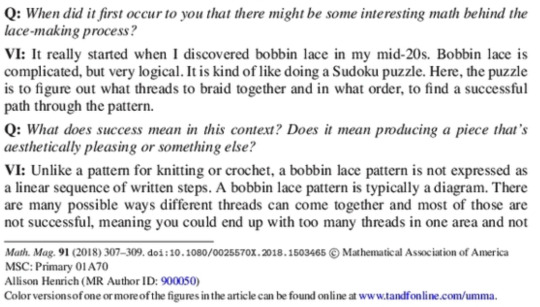
#crafts#crafting#making#lace#lacemaking#knitting#mathematics#topology#geometry#bobbin lace#tatted lace#tatting#complexity#patterns#industrial revolution
1K notes
·
View notes
Text
Lord Byron writing about book-burning, queer representation, and the value of poetry . . . in 1821:
“Let us hear no more of this trash about ‘licentiousness.’ Is not ‘Anacreon’ taught in our schools? translated, praised, and edited? Are not his Odes the amatory praises of a boy? Is not Sappho's Ode on a girl? Is not this sublime and (according to Longinus) fierce love for one of her own sex? And is not Phillips's translation of it in the mouths of all your women? And are the English schools or the English women the more corrupt for all this? When you have thrown the ancients into the fire it will be time to denounce the moderns. ‘Licentiousness!’ — there is more real mischief and sapping licentiousness in a single French prose novel, in a Moravian hymn, or a German comedy, than in all the actual poetry that ever was penned, or poured forth, since the rhapsodies of Orpheus. The sentimental anatomy of Rousseau and Madame de Staël are far more formidable than any quantity of verse. They are so, because they sap the principles, by reasoning upon the passions; whereas poetry is in itself passion, and does not systematise. It assails, but does not argue; it may be wrong, but it does not assume pretensions to Optimism.”
Context: this letter was written during the Bowles-Pope Controversy, a seven-year long public debate in the English literary scene primarily between the priest, poet, and critic William Lisle Bowles and the poet, peer, and politician Lord Byron. The debate began in 1807 when Bowles published an edition of the famous writer Alexander Pope’s work which included an essay he wrote criticizing the writer’s character, morals, and how he should be remembered. Today, we would say that Bowles tried to “cancel” Alexander Pope, who had affairs without marrying, and whose works had sexual themes. Lord Byron defended Pope, who was one of his all-time favorite writers. Pope had been dead since 1744, so he was not personally involved. This debate shows that while moral standards have changed throughout the centuries, the ways people have debated about morality have remained similar.
Source of the excerpt: — Moore’s Life of Byron in one volume, 1873, p. 708 - https://books.google.com/books?id=Q3zPkPC8ECEC&pg=PA708&lpg=PA708&dq=%22Are+not+his+Odes+the+amatory+praises
Sources on the Bowles-Pope Controversy: — Chandler, James. “The Pope Controversy: Romantic Poetics and the English Canon.” Critical Inquiry, vol. 10, no. 3, 1984, pp. 481–509. JSTOR, http://www.jstor.org/stable/1343304. — https://www.britannica.com/topic/Pope-Bowles-controversy — Bowles, Byron and the Pope-controversy by Jacob Johan van Rennes, Ardent Media, 1927.
#literature#english literature#romanticism#poetry#lord byron#aesthetic#dark academia#history#writing#alexander pope#literary#lit#english#reading#lgbt#sappho#book burning#book banning#libraries
506 notes
·
View notes
Text
So I came across the Mayfair Witches thing with Lestat and Felix, and like pretty much everyone on here I was bummed but then I though about it for a very long time, went through the books again and… here’s how I think they can still make it work. Just as a disclaimer though, I’ve only fully read IWTV and TVL, and am currently like 1/3 through QOTD, so if there’s anything in the books after that that disproves my theory I’m sorry! But since the Lestat/Felix arc takes place towards the end of IWTV, I thought I’d still give it a go.
So the main issue here that people bring up is that if Lestat taught Felix to “cull the herd”, he can’t be book Lestat because book Lestat admits to only killing the “evildoers”, so why would he tell Felix to be so merciless? The answer: it’s complicated.
Lestat, the book and the show version, is unfortunately (or fortunately because that’s part of what makes him so interesting) a man who often does the opposite of what he says. I took a closer look at his first moments with Gabrielle after he turns her, and we have a similar situation in which he’s teaching her how to kill. Here’s an excerpt from it:
“I found a victim as soon as we had crossed the river […] [a]nd as I lured the victim out of the tavern, as I teased him, maddened him, and then took him, I knew I was showing off for her, making it a little crueler, more playful. And when the kill came, it had an intensity to it that left me spent afterwards.” (TVL, p. 147)
When he’s teaching others how to kill, he likes to show off. Simple as that. I’m sure the victim he chose was a criminal, like most his victims, but the point is he never told Gabrielle that. To her knowledge what Lestat just did was brutally murder some random man. Two pages later we have the following passage when Gabrielle makes her first kill and it’s the guy on the horse she ends up stealing the clothes from:
“I was shaken. The innocence of her victims didn’t trouble her. She didn’t fight my moral battles. But then I didn’t fight them anymore either, so why should I judge her? Yet the ease witch which she slew the young man – gracefully breaking his neck when the little drink she took was not enough to kill him – angered me tough it had been extremely exciting to watch. She was colder than I. She was better at all of it, I thought. Magnus had said, “Show no mercy.” But had he meant us to kill when we did not have to kill?” (TVL, pp. 149-150)
Lestat obviously doesn’t feel comfortable killing innocent people, but there’s not one scene in which he either tells someone he’s having moral dilemmas with it, or tells others they shouldn’t kill innocent people. It’s his thing, and it’s his struggle, but he never shares it until he writes about it in TVL. Here’s another excerpt that highlights this:
“When [Louis] says I played with innocent strangers, befriending them and then killing them, how was he to know that I hunted almost exclusively among the gamblers, the thieves, and the killers, being more faithful to my unspoken vow to kill the evildoer than even I had hoped I would be?” (TVL, pp. 434-435)
The key phrase here is “how was he to know”, so Louis had no idea! All this time he spent with Louis, and he never told him that’s what he was doing! Which brings me back to the show, to the reunion moment where Lestat tells Louis “I don’t like to point out my virtues.”

Of course, in the context he’s talking about not telling him he saved him at the trial, but it’s a pretty general statement about himself and it’s true, so far, in the book. He only kills innocent people, never tells anyone about it. He saves Louis at the trial, never tells anyone about it. And while I’ve seen some theories about how him not telling Louis he saved him was part of some pact he made with Armand, I’m just going to take things at face value here until the show proves otherwise.
Lestat always claims he’s “evil” in the books, but he does a whole bunch of stuff to disprove that. I think part of why he doesn’t let people know his good deeds is because there’s a part of him that wants to be perceived as the “evil monster” that he sees himself as. It’s the biggest irony ever for Lestat out of all vampires to claim he’s evil when he’s never acted with malicious intent (in the books, but I would even say in the show as well but the show is more complex in that regard).
The big thing about Lestat, which would also set him apart from show!Louis is that he does his thing and lets others do their thing. He doesn’t interfere with others, doesn’t tell them how to live their lives “the correct way”. Sure, he has many heated discussions about it with Nicki, but those are not him telling Nicki he should live according to his philosophy just because he thinks it’s the correct way to view life. Nicki hates himself at that point, which just gets worse with his way of thinking, and Lestat’s trying to pull him out of that. Nicki’s worldview is actively harmful to him and at least part of the reason for his eventual demise. But that’s not really relevant here, so I’m just going to leave it at that.
Which brings me back to Felix and Lestat. Did he, at some point, go out of his shack to kill people to show Felix how to do it? Not necessarily. The show doesn’t say he did, he could’ve simply just told him how to do it, he did after all figure it out himself too. It’s pretty intuitive I suppose for a vampire, and even when Claudia does her first kill Lestat isn’t shown killing first. He waits in the car with Louis and Claudia manages just fine.
Lestat knows what’s in their nature as vampires, but he himself doesn’t follow it at all times. It’s implied in one of the excerpts above, when he says he’s “being more faithful to [his]unspoken vow to kill the evildoer than even [he] had hoped [he] would be.” He’s not holding himself to any strict rules or high standards here. He’s trying his best, and if he takes an innocent life, he probably feels uncomfortable about it (while he secretly enjoys the feeling) but he’s probably just like “oh well.”
And with Felix, it could absolutely be a situation of do as I say, not as I do. He teaches him what’s in their nature, but he himself chooses to do differently. That, to me, sounds quite a lot like book!Lestat.
Besides, another aspect I’d like to point out is the definition of the word “cull”. Since English isn’t my native language, I had to look it up to really get all the nuances it implies. Here’s what google says:

“Selective slaughter”. Now here’s where I might be wrong and please correct me if I am, but since there are parallels to Darwin in MW, couldn’t that also imply selectively killing a particular group of people? As in, weed out the evildoers, or the weakest who don’t have a chance of survival anyways (as Lestat does after Louis tries to kill him)? The latter would make sense with the Darwin parallel. What we see in MW may be skewed through Felix’ perspective. I haven’t watched MW, but these things happen all the time in IWTV. Killing mercilessly may be only his interpretation of what Lestat said.
TL;DR: Lestat understands vampiric nature well enough to teach others how to kill “like a vampire” when he himself still chooses to do differently. He also doesn’t “like to point out [his] virtues” which is why he never actually told anyone he only kills criminals.
#iwtv#iwtv theory#interview with the vampire#amc iwtv#iwtv amc#lestat de lioncourt#louis de pointe du lac#iwtv felix#i’ve gone through this three times now and i’m still not sure i should post it but i guess i will#maybe i’m missing something super obvious idk#but it made me feel better about it so maybe it’ll make someone else feel better too
23 notes
·
View notes
Text

NPS Photo of a cedar tree at Mount Rainier National Park with a section of peeled bark. Shorter sections of bark like this could have been used to create folded baskets with sewed edges. Longer peeled sections are also collected for strips to weave baskets.
Native American Heritage Month - Western Red Cedar
Going back thousands of years, nearly every part of a Western red cedar tree has a use by indigenous people. The wood is harvested for house planks and posts, storage containers, canoes, ceremonial materials, and religious items. In coastal areas, the withes, or thin flexible branches, are made into ropes for whaling and for bindings. The roots are used for binding and basketry. Uses of red cedar bark include basketry, clothing, and cordage. Bark infusions were consumed to help regulate menstruation while an infusion of twigs and bark treated kidney conditions. Drinking infusions of boughs was used to treat colds, coughs, and sore throats. Chewing the buds served to relive the pain of toothaches.
Jack McCloud, a member of the Nisqually Tribe, describes traditional tools to peel cedar bark. “Back then we used like a sharp rock and pounded it through the bark. …to get it started you take anything sharp …, some people would sharpen a horn, something … to get underneath the bark. That is, all you have to do is get it started, then take it by the hand, and start peeling it. And you can peel it, if you are lucky, 50-60 feet… everybody had a different method… As we were told, take up to a third to a quarter of the bark and it won’t kill the tree, and we were taught that. Don’t kill the tree and let the tree grow again. It will grow back, some of the bark, not all of it.” (Jack McCloud 2015)

NPS Photo of bark peeling tools. Tools can be knives or fashioned out of antlers.
Studies of traditional cedar bark harvesting have found that bark harvesting in this fashion (peeling a single strip two-hands wide or no more than a third of the circumference of the tree) does not reduce the growth rates or survival of bark-peeled cedars.
Excerpts are from “Plants, Tribal Traditions, and the Mountain”, G. Burtchard, D. Hooper, & A. Peterson, 2024, pp 135-148. Available at https://go.nps.gov/Plants-TribalTraditionsReport
38 notes
·
View notes
Text
THE MAGIC CIRCLE, or "WTF is Darkness, anyway?"
Part One
A comprehensive, themes-first take on what Deltarune is "really about"

…play is not "ordinary" or "real" life. It is rather a stepping out of "real" life into a temporary sphere of activity with a disposition all of its own. Every child knows perfectly well that he is "only pretending", or that it was "only for fun"… Nevertheless, […] the consciousness of play being "only a pretend" does not by any means prevent it from proceeding with the utmost seriousness, with an absorption, a devotion that passes into rapture and, temporarily at least, completely abolishes that troublesome "only" feeling. Any game can at any time wholly run away with the players. The contrast between play and seriousness is always fluid. The inferiority of play is continually being offset by the corresponding superiority of its seriousness. Play turns to seriousness and seriousness to play. Play may rise to heights of beauty and sublimity that leave seriousness far beneath… All play moves and has its being within a playground marked off beforehand either materially or ideally, deliberately or as a matter of course. Just as there is no formal difference between play and ritual, so the "consecrated spot" cannot be formally distinguished from the play-ground. The arena, the card-table, the magic circle, the temple, the stage, the screen, the tennis court, the court of justice, etc., are all in form and function play-grounds, i.e. forbidden spots, isolated, hedged round, hallowed, within which special rules obtain. All are temporary worlds within the ordinary world, dedicated to the performance of an act apart.
J. Huizinga, Homo Ludens, pp. 8-10.
Introduction: No, really, what is Darkness?
The connective tissue of this rather wide ranging essay lies in its being premised on a two-fold understanding of this omnipresent concept within the narrative of Deltarune – “Darkness” – as not only a crucial plot device governing the supernatural mechanics within the diegesis but also, on a subtextual level, a metaphor for humanity‘s imaginative capacity, specifically the ability to suspend disbelief and temporarily immerse oneself in the internal logic of fictional narratives. Darkness is in essence a literalization of the concept of the “the magic circle”, described in the excerpt above from Dutch theorist Johan Huizinga’s seminal work of cultural theory, Homo Ludens.
There is extremely strong support for this thematic interpretation of Darkness. Not only does the actual content of the two currently released chapters of Deltarune make repeated and explicit comparisons between Dark Worlds and roleplaying games, along with Dark Worlds being deeply steeped in the tropes of fantasy fiction in general, but this metaphor is also embedded into the very form of the game. Whenever a Dark World is entered, Deltarune transforms from an experience of minimal gameplay into a fairly traditional roleplaying video game, complete with battle, party and save systems.

Within the story, Dark Worlds function almost identically to some of the most primitive (narrativized) forms of play among children, literally animating toys and other objects to life. The Lightners then exhibit similarly contradictory behavior vis-a-vis Dark Worlds as humans do when entering the “magic circle” – prepared to take whatever transpires within it very earnestly, and quick to rationalize and adjust to almost anything regardless of how "unnatural" it might seem. If the going ever gets too rough within the Dark World, however, the Lightners are prone to reminding themselves of the subordinate position of what they’re experiencing to “reality”, and indeed, once the Fountains are sealed and the Dark Worlds exited, objects which had come to life turn inanimate again, and the Lightners quickly find themselves reverting to the logic of everyday life.
Most frequently the separation between these worlds is expressed through a comparison between the Dark Worlds and dreams, a constantly recurring motif throughout the first two chapters. Dreams themselves – as phenomena where human beings tend to stop detecting unreality, operating earnestly within the bounds of a “constructed” world – have a long history of being compared to fiction, especially with the advent of more vividly visual-temporal mediums like films and video games.
The opening stanza of Cecil Day Lewis's poem "Newsreel" is illustrative:
Enter the dream-house, brothers and sisters, leaving Your debts asleep, your history at the door: This is the home for heroes, and this loving Darkness a fur you can afford.
I believe this understanding of Darkness to lie at the thematic core of Deltarune, informing almost every other narrative thread contained within it. With that in mind, the goal of this essay is to investigate and make sense of the first two chapters of the game, answering some of the biggest questions posed by the narrative thus far, and speculating about what direction it might be heading in, all while orbiting around this central metaphor of Darkness as the power of creative expression.
First on the agenda is perhaps the most hotly debated topic in the community: the question of the Knight.
Finding the Knight
If our goal is to discover who the Knight might be, it behooves us to establish a rudimentary profile of the kind of person we’re looking for. This is a relatively simple task, as the information we have about the Knight is rather limited and can be reduced to a couple of key points.

1. The Knight creates Dark Fountains.
The most important knowledge we have about the Knight, by far – their primary distinguishing feature – is that they are in the business of creating Dark Fountains. It is among the first concrete pieces of info we learn about the character during their formal introduction by King in Chapter 1, and what primarily foregrounds our understanding of them. If we want to find the Knight, we need to look for someone we have cause to believe is going around creating Dark Fountains in the Light World.

2. The Knight is already familiar with the mechanics of Dark Worlds.
The second most important thing we know about the Knight is related to the first: they specifically created the Dark Fountains of Chapter 1 and 2. This can be intuited from King’s words in Chapter 1, and Queen confirms it outright. This fact has important consequences: if the Knight created the Dark Worlds of Chapter 1 and 2, they must have known how to do so before anyone from those Dark Worlds told them. To find the Knight, we should be on the lookout for someone we have reason to believe already knows about the mechanics of Dark Worlds before the events of the game.

3. The Knight wields a bladed instrument, specifically a knife.
Queen says in no uncertain terms that the Knight used a blade to create the Library Fountain. She then generates an illustrative diagram showing a knife. We are looking for someone who wields knives and uses them to create Dark Fountains.

4. Darkners tend to believe the Knight wants to cause the Roaring.
Though King and Queen don’t actually seem to know the specifics of what the Roaring entails, they both believe that the Knight wants to blanket the Light World in Darkness. Queen, however, explicitly says that she was only assuming this based on the Knight’s actions, strongly implying she hasn’t even met or talked with the Knight. King, for his part, appeals to the Knight’s “will”, which he similarly believes himself to know. It’s not immediately clear why King and Queen believe so strongly that this is the Knight’s plan, beyond potentially assuming it from the mere fact that they are creating Fountains in the Light World. It’s relevant information, no doubt, but not quite as concrete as the other points. Still, at the very least we seem to be looking for someone rash enough to risk the potential end of the world for their goals, if that isn’t their goal to begin with.
We know some other small things about the Knight; Jevil and Spamton are familiar with them in some way (as are many other Darkners), and we have some ominous remarks about communion and hell’s roar and shadows in their hand, but ultimately these are too ambiguous to make much of.
Having erected these four key points, we can now ask ourselves: do they apply to any character in Deltarune?

Well, yeah, as it turns out, there is a character who fits every single criterion listed above. This makes them, to put it bluntly, an incredibly compelling suspect. No prizes for guessing this one: it’s Kris.
What, were you expecting a mystery?
Before going any further, I need to say that when it comes to arguing for Kris being the Knight in this essay, I will be concerning myself almost exclusively with making a positive case for it. Which is to say that this is not a “defense” of Kris Knight, but rather my formulation of it. I won’t be bringing up any common counterarguments (though some of them will be organically refuted over the course of this essay), in part because I want readers to engage with the writing on its own terms, instead of it getting bogged down in the tedious Knight discourse that has consumed the community for the past few years. However, I’m aware of what a controversial point this is, and that there are those in the community who consider Kris to be a total non-starter as a candidate - all I can do is hope that those readers extend me enough grace to entertain the ideas I present here with an open mind.
To get the obvious out of the way, the main piece of evidence for Kris being the Knight is the fact that we see them create a Dark Fountain on screen outright. This immediately fulfills our first criterion: Kris is someone who is willing and able to create Dark Fountains.
Next we must ask ourselves whether it’s possible that Kris created the fountains of Chapter 1 and 2 and was thus already familiar with the mechanics of Dark World creation before the events of the game; as it turns out, this is not only possible but exceedingly likely.



This is because between Chapter 1 and 2, during a time in which Kris’s actions are ominously unaccounted for, we know that the TV is plugged back in after ages of not seeing any use, and that Toriel’s butterscotch pie is eaten by Kris: two things which directly lead to the Fountain creation at the end of Chapter 2 – the need to bake a new pie provides a distraction for Kris to slash Toriel’s tires, forcing Susie to stay over and pushing Toriel to call the police, and the TV is chosen by Kris as the focal point of the Chapter 3 Dark World. Moreover, ominous narration such as (It is not yet time to wash your hands.) if you try to do so at the beginning of the chapter, the general narrative continuity between the ending scenes of Chapter 1 and Chapter 2, and the fact that Kris makes specific arrangements to the rooms like turning on the TV (similar to how the laptop was turned on before the Library Fountain was created) and opening the door, all seem to point to the Fountain being premeditated, which would necessarily mean that their knowledge of Dark Worlds precedes the game’s opening. It should also be uncontroversial to acknowledge that not only does Kris wield a knife to create the Dark World of Chapter 3 (the same knife they brandish at the end of Chapter 1), but they're heavily associated with knives in general, with even their name – "kris" – being the name of a distinctive dagger. It's hard to imagine any other character fitting the third criterion so perfectly.
Finally, though we are no closer (for the moment) to understanding why King and Queen were so confident about the Knight’s intentions, it can absolutely be shown that Kris is rash enough to, at the very least, risk the end of the world: they already know about the danger of the Roaring from Ralsei, but it doesn’t stop them from creating a Dark World. If they aren’t the Knight, they are arguably behaving even more rashly; it would mean that they are knowingly contributing to more Dark Worlds being created while there’s someone already going around creating them, massively increasing the risk of the Roaring. Kris even creates a Fountain on the Weird Route, despite experiencing firsthand the very real threat that Dark Worlds can pose to Lightners who venture into them. All in all, the Fountain creation at the end of Chapter 2 serves as more than enough evidence of Kris behaving in an extremely reckless and potentially morally questionable fashion. It’s perhaps not impossible to understand why King and Queen assumed that they are trying to cause the Roaring on purpose.
Of equal importance to the above evidence is the fact that Kris being the Knight is a perfect fit for Deltarune’s themes, which encompass topics like escapism, agency, freedom and the power of fiction. As one might expect from a well-constructed narrative, these are all relevant to Kris, the protagonist of the story, and these connections are only strengthened if Kris does turn out to be the Knight.
As stated earlier, the Dark Worlds are a relatively unsubtle metaphor for fictional creation and roleplaying. They are dream-like fantasy worlds where good guys band together and go on adventures to stop the bad guys. If Kris is the Knight, that means they are essentially authoring these metaphorical fictional worlds, serving something of a dungeon master role where they literally create the settings, obstacles and conflicts to overcome, and then guide the stories of those conflicts to their resolutions; not only by accompanying the player and Susie on their hero's journeys, but also through Ralsei, the party's guide, tasked with keeping the adventure "on rails" so to speak (evidence strongly points to Ralsei, who is likely Kris's horned headband that goes missing some time before the events of the story, being in cahoots with Kris – watch Black Chestnut's wonderful "Ultimate Ralsei Theory" for more on this). From this perspective, “the Knight” is rather more like a persona that Kris adopts when necessary, no more reflective of their real personality than the prophetic hero role they assume when we take control of them.
Think back to them slashing the tires and opening the door at the end of Chapter 2; the mythology of the Knight is practically being built in real time – "this dastardly Knight is now targetting our Lightners, going so far as to break into their homes!" – it's almost a comic analogue to Deltarune theories which take the character at face value, such as the one positing that the Knight hid in the closet of the Library before ambushing Noelle and Berdly. And one gets the feeling Kris treats this all as separate from themselves. Just think of how into the performance they get; big flashy gestures, red eyes, knives – the Roaring Knight is essentially an anime villain! But Kris isn't any less invested in their role as the hero of prophecy, either. And this seems to reflect what we know of Kris’s Light World personality; we’re told that they’re mischievous, and sometimes take their pranks too far, but we also get indications that they have a kind-hearted disposition and like to help people out. Symbolically, these dual aspects of Kris’s personality are intensified in their Delta Warrior and Roaring Knight personas.

This ties into the theme of escapism; we see that the Dark Worlds serve an important role for the Lightners who venture into them. They provide the troubled teenagers with hope, entertainment, reprieve from their troubles, self-confidence, a medium of connection with others, and a way to reflect on their lives and provide it with meaning. At the same time, they risk being consumed by the allure of that unreality, embodied in the Weird Route’s erratic, obsessive actions that put the Lighters in danger (itself indicative of the player getting "too invested" in the game), and of course with the Roaring itself, which happens when Dark – the domain of fiction – overpowers Light, the domain of reality. If Kris is the Knight, it at the very least highlights the danger of their commitment to the Darkness, especially in light of the fact that Kris creates the next Fountain regardless of whether Berdly dies or not, even if we don't yet have a clear picture of their intentions or whether they have a good reason for their troubling actions.
Kris is at the epicenter of the themes of agency and freedom in Deltarune, mainly explored in the memorable chapter endings where Kris rips out their player-controlled heart to do things without our prompting, and in the quests of the secret bosses where the ongoing motif is a confrontation with the characters’ own static existence, their lack of agency as lines of code in a video game, forced to play a particular role – especially apparent in the quest of Spamton, whose similarities to Kris lead to them becoming quite visibly distraught by the end. This is true irrespective of Kris being the Knight, but one can't help but notice how well that development plays into the established divide between the player and the protagonist; if Kris is the Knight, that would sharpen the contradictions even more and mean that where we control Kris as the protagonist, they also act as our antagonist when they disconnect from us, creating the Dark Worlds we later have to seal. This separates Kris’s character even more from our control of them and their function as our player avatar, blurring the lines between who's "really in control" of the story.
Earlier we went over the strong textual evidence for Kris being the Knight, but sometimes we might have reasons to be skeptical about a seemingly obvious conclusion if it conflicts with the mode of storytelling or thematic framework of a narrative. That is not the case here; at the very least Kris being the Knight does not conflict with any of the core themes of the story. I'd go much further, though, and say that it massively deepens and adds layers to those themes. It’s a decision the story would only benefit from.
There are many questions that remain. The Darkners seem to be quite familiar with the Knight, but we know that Kris couldn’t have entered the Fountains and made themselves known, because that would mean the Darkners would've immediately recognized Kris as the Knight when we later inhabit them. We actually don’t even know if it’s possible to enter the Dark Fountains without sealing them in the first place; Ralsei and Lancer make it sound like you can’t in Chapter 1.
Though we have a satisfying enough answer to who’s responsible for the Dark Worlds, we don’t yet have a great understanding of the internal dynamics of those worlds. How could it be that the Darkners know about the Knight without ever having met them? This is something we must inquire into.
To be continued in Part Two.
#the magic circle essay#deltarune#undertale#kris dreemurr#deltarune meta#deltarune theory#undertale theory
21 notes
·
View notes
Text
I've written a public essay in which I'm working out the way Black women and Black girls perform their sexuality in public landscapes. This essay references Megan Thee Stallion and her orchestrated abuse, Delainey Hayles as Claudia Du Lac in the TV series Interview with the Vampire and the Black woman as jezebel, amongst other points. Since this essay is public, to profit from it, I would appreciate anybody this essay deeply exalted to tip. Pp: [email protected]



The moving gifs above best visually sum up the essay. Here are some excerpts to whet your appetite:
To be overdetermined by their flesh is a narrative running through Black women and Black girls. The gaze is othering, glassy and blotting. Many a day Black girlhood and womanhood appears a ghostly dot of excessive meat, a haunting blotted carcass. It strains towards the biblical Jezebel, the queen mother whose cruel sinfulness had her cadaver crushed up by wild dogs, as was prophesied by Elijah. Insofar as biblical Jezebel goes, she is murderous, sly and luxurious.
and
But Megan Thee Stallion floats through the world of anime and video games, with cosplay, references, and player technology soaking through her aural and visual performances. The rapper manages to insert within the playful and fantastic universe of the gamer a sexuality that is at once theatrical, hilarious, and self-referencing. Megan Thee Stallion isn't Jezebel, but Menat. What's more exquisite than two bad bitches ?
and
On stage, she becomes sexless and almost genderless, the little girl she is registering more as a an impossible child than as a gendered character; she is funny at the expense of herself. Lulu is scripted within the grotesque of the minstrel show; a high uppity Black girl that must be subdued with the violence of the hammer and the nail. She doesn't exude the menacing sexuality of the Black woman, as she's punished before growing into it. Claudia Du Lac's subsequent speech brings forth the misuse of the signifiers that burrow her flesh, and the constant vertigo to which she is therefore exposed as she must celebrate her pain.
46 notes
·
View notes
Text
Excerpt from this story from Mother Jones:
Oil and chemical companies who created a high-profile alliance to end plastic pollution have produced 1,000 times more new plastic in five years than the waste they diverted from the environment, according to new data obtained by Greenpeace.
The Alliance to End Plastic Waste (AEPW) was set up in 2019 by a group of companies which include ExxonMobil, Dow, Shell, TotalEnergies, and ChevronPhillips, some of the world’s biggest producers of plastic. They promised to divert 15 million metric tons of plastic waste from the environment in five years to the end of 2023, by improving collection and recycling, and creating a circular economy.
Documents from a PR company that were obtained by Greenpeace’s Unearthed team and shared with the Guardian, suggest a key aim of the AEPW was to “change the conversation” away from “simplistic bans of plastic” that were being proposed in 2019 amid an outcry over the scale of plastic pollution leaching into rivers and harming public health.
Advertise with Mother Jones

River Buriganga, in Dhaka, Bangladesh.Suvra Kanti Das/Zuma Press
This story was originally published by the Guardian and is reproduced here as part of the Climate Desk collaboration.
Oil and chemical companies who created a high-profile alliance to end plastic pollution have produced 1,000 times more new plastic in five years than the waste they diverted from the environment, according to new data obtained by Greenpeace.
The Alliance to End Plastic Waste (AEPW) was set up in 2019 by a group of companies which include ExxonMobil, Dow, Shell, TotalEnergies, and ChevronPhillips, some of the world’s biggest producers of plastic. They promised to divert 15 million metric tons of plastic waste from the environment in five years to the end of 2023, by improving collection and recycling, and creating a circular economy.
Early last year the alliance target of clearing 15 million metric tons of waste plastic was quietly scrapped as “just too ambitious”.
The new analysis by energy consultants Wood Mackenzie looked at the plastics output of the five alliance companies; chemical company Dow, which holds the AEPW’s chairmanship; the oil companies ExxonMobil, Shell, and TotalEnergies; and ChevronPhillips, a joint venture of the US oil giants Chevron and Phillips 66.
The data reveals the five companies alone produced 132 million metric tons of two types of plastic, polyethylene (PE) and polypropylene (PP), in five years—more than 1,000 times the weight of the waste plastic the alliance has removed from the environment in the same period. The waste plastic was diverted mostly by mechanical or chemical recycling, the use of landfill, or waste to fuel, AEPW documents state.
The amount of plastic produced is likely to be an underestimate as it only covers two of the most widely used polymers: polyethylene, which is used for plastic bottles and bags; and polypropylene, used for food packaging. It does not include other major plastics such as polystyrene.
The new data was revealed as delegates prepared to meet in Busan, South Korea, to hammer out the world’s first treaty to cut plastic pollution. The treaty has a mandate to agree on a legally binding global agreement to tackle plastic pollution across the entire plastics life cycle.
But the talks, which have been subject to heavy lobbying by the alliance and fossil fuel companies, are on a knife-edge in a row over whether caps to global plastic production will be included in the final treaty.
Will McCallum, a co-executive director at Greenpeace UK, said the revelations had stripped off the thin layer of greenwash hiding the growing mountain of plastic waste oil companies were producing.
“The recycling schemes they’re promoting can barely make a dent in all the plastic these companies are pumping out,” he said. “They’re letting the running tap flood the house while trying to scoop up the water with a teaspoon. The only solution is to cut the amount of plastic produced in the first place.”
21 notes
·
View notes
Text
Rebaked!Au
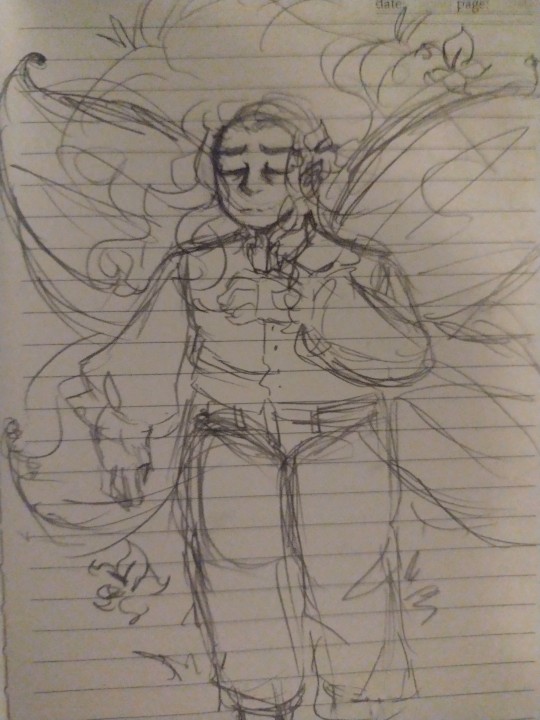
:pp
Basic story:
The witches rebaked Elder Faerie because having one sole continuous guardian is far easier than it switching up, but one negative to this process is loss of memories.
Okay so the longer version :p:
Dark Enchantress was able to remember everything when she was rebaked due to her not undergoing the special processes the witches have, which is basically a more formal process. When you are truly rebaked you're completely crumbled into a mixture with an accurate measurement of new dough with the same exact ingredients and completely remade.
This is done to make sure there's no missing parts or cracks that can reappear. It completely cleanses the crumbling dough both revitalizing the lost body and the mind. Because you are completely broken down and remolded you don't retain any of your memories.
Elder Faerie is left on earthbread with one duty. To protect the seal.
But there's one small issue.
What seal?
Elder Faerie is left to wander beast yeast all alone, soon to stumble across a certain silver kingdom 👀
And now some discord excerpts!:
Knight: do....do you remember anything before your time in the forest..???
Ef: uh...hmm not really I suppose... I do remember some witches but that seems unimportant-
Mercurial: you w h a t.
Ef: it seemed irrelevant.....
Silverbell: IRRELEVANT?!??!??
Mercurial wondering if witches could reanimate the dead: 😰😰😰😰
-----------------------------------------
Ef: wow those sudden lights in the sky are really bright, I wonder how they work....
Mercurial passing by doing his rounds for the party and seeing his definitely dead king right there:
-----------------------------------------
Amnesiac Elder faerie gets held hostage by his own kingdom (lovingly)
-----------------------------------------
Anyways that's all- feel free to ask questions lol
#elder faerie cookie#elder fairy cookie#silver kingdom#cookie run kingdom#cookie run#art#new au?#oh no ef bouta bring up all the trauma#basically my excuse to bring my bbg back :>
74 notes
·
View notes
Text
Major Jegulus Fluff and Sap
323 words of excerpt below my little commentary.
Feeling generous and just so impatient to share the more mature years of the story. You all don't know it yet, but I am a sucker for super sappy Jegulus. Like so sweet it might turn your stomach. Just wait...
What I'm posting versus what I'm currently writing and editing is like two different worlds. So here is some of a future installment which hasn't even been announced yet. O.o
Reg POV, sixth/seventh year
...
“Yes, I love healing with you.” James walked to the toilet and started to pee, Regulus left the door open as he walked to the kitchen.
They lounged about, James telling Regulus stories. Then Regulus told a few of his own. He told James about the night they met on the astronomy tower, how he was already head over heels for Sirius’ best friend, James Potter. How James had grabbed his hand and Regulus felt truly seen by someone for the first time in years.
“I used to take certain routes between lessons because I’d cross your path,” admitted Regulus.
James laughed, “didn’t people think that was strange?”
“I was usually alone, no one even noticed. Including you.”
James gave him a mild look, “I started falling for you the day we crossed paths on the quidditch pitch. You were such a snarky little bitch. I loved it.”
“I saw you on Platform Nine and Three-Quarters when I was ten. You were running through the crowd laughing and I thought you looked so free.”
“I was so nervous my first day,” said James. “I covered it all up with exuberant behavior.”
“Does that imply you are actually an anxiety ridden wreck and cover it up with general arrogance?”
“Aṉpu,” said James, hand over his heart, “of course I’m an anxiety ridden wreck. Half of my heart is walking around outside of my body.”
“You know how it feels then?”
“To see you and feel like I was holding my breath. To feel my heart restart when I catch a glimpse of you across the great hall. To know that I’m the only one who knows all of you. Yeah Reg, I know how it feels.” James wove their fingers together.
...
I mean is this cruel to share knowing the work isn't going up on Ao3 for a year... SO MUCH to share before then. Including all those little moments the boys alluded to. ;-)
Check out my pinned post for more info, currently posting year one of this epic series!
iwriteasfotini on Ao3
PS My beta reader (and partner) who is cis, straight, white, and mid-thirties says my Jegulus scenes often invoke eyerolling for him. "Here we go again." Fuck yes, here we go again. And again. And again! Never too much sappy Jegulus. XXXXXXX
PPS It should speak volumes he's willing to plow through those lovey dovey Jegulus moments for everything else I'm bringing in this series. Brace yourselves people, shite's going to get real!
#our love is written in the stars#regulus black#james potter#starchaser#marauders era#dead gay wizards from the 70s#jegulus#regulus x james#james x regulus#james loves regulus#desi james potter#james fleamont potter#james potter loves regulus black#fluff#sunseeker#archive of our own#ao3 writer#ao3#never too much sappy jegulus
25 notes
·
View notes
Text
2024 SiWC Panel with Diana Gabaldon
Greetings Outlander fans! My, I have missed you all… 🤗
This weekend I find myself in beautiful Surrey, British Columbia, Canada, attending the Surrey International Writers’ Conference, more commonly known as SiWC!
I drove from Oregon to Canada lastThursday. It was a beautiful day but the normally 5.5 hr drive turned into nearly 7 hours due to two collisions in Washington state. Yes, it was an inconvenience for those on the freeway, but I was grateful to arrive safely and I hope those involved in the crashes are OK.
Thus far, I have attended several events featuring Diana – she is one busy lass! All were delightful and I will share them with you, but not in chronological order mostly due to the technical issues of posting via iPad. 😉
Today’s event was titled “Compelling Expositions,” a panel featuring Diana Gabaldon, Michael Slade, Robyn Harding, and Darren Groth (not shown). K. C. Dyer moderated (also not shown).
Diana looked stunning, layered with in a deep red shawl because the room was freezing! 🥶

Many fruitful topics were covered by the panel. Here are some highlights including Diana’s responses:
Question: Which is your fav scene from your writings? Diana chose the scene from “Outlander” book wherein Jamie rescues Claire from Black Jack Randall’s clutches. They shelter at a tavern – Jamie tells Claire he is not ready for bed and proceeds to whip her with his sword belt. This set up a major clash between the two characters because each POV was justified from their perspective. Claire was trying to find a way back to Frank but Jamie knew her actions put all of their lives in danger. I must confess, this choice surprised me. I suppose because Diana has written so many splendid scenes. How would one even choose? 🤔
This is wee bit of the excerpt from the scene (pp. 249-250 “Outlander” Kindle version) that is Diana’s fav!
“Come to bed, Jamie. What are you waiting for?”
He came to stand by the bed, swinging the belt gently back and forth.
“Well, lass, I’m afraid we’ve a matter still to settle between us before we sleep tonight.” I felt a sudden stab of apprehension.
“What is it?” He didn’t answer at once. Deliberately not sitting down on the bed by me, he pulled up a stool and sat facing me instead.… 😯
Question: How do you deal with pacing? Diana responded that pacing depends on context. For example, if there is an emergency then the writer wants to keep sentences short and terse. Pacing allows the author to create tension between two elements. A question is raised and then answered to move the story forward. (Psst…. She didn’t mention that sometimes the answers to questions she raises don’t get resolved until two books and ten years later!) 😂
Question: How do you deal with slang or dialect? Diana feels dialogue is the most important way to define a character. An author using another language (e.g. Gaelic) needs to educate themself in the language. She watched films with Scottish characters to hear their spoken English. At conferences, if she heard anyone speaking with a Scottish accent, she invited them for coffee and listened to them speak. Diana also recommended reading books written by someone who speaks the language. She read several Scottish authors to help her get a feel for syntax, cadence, etc. Frankly, her devotion to her craft is a splendid example to all aspiring authors. 🥰
Question: Do you plan out a chapter or scene ahead of time? Diana does not. We already know she doesn’t write in a straight line. She also does not tell her characters what to say or do. She waits patiently for them to speak to her. This being my fourth SiWC, I can tell you hers is a unique approach. Most writers I encounter plan out scenes, many even work from a classic outline. She also doesn’t know ahead of time how a book will end. I guess the one exception here is that she seems to know how the “Outlander” books will end. Sob! 😢
Question: Who is your favorite author. James Clavell, she answered without a moment’s hesitation. Clavell authored the marvelous, “Shogun,” for those who might not know. Although it has been some time since I read it, it is well worth doing so. 👍🏻
These were highlights of the panel for me.
The full panel discussion can be accessed on the blog.
I hope you enjoyed the panel. Need I say, my fav author for “Compelling Exposition” is none other than Diana Gabaldon? 🤩 🥇 🏆
The deeply grateful,
Outlander Anatomist
Follow me on:
Twitter: @OutLandAnatomy
Facebook: OutlandishAnatomyLessons
Instagram: @outlanderanatomy
Tumblr: @outlanderanatomy
Youtube: Outlander Anatomy
Photo and audio credits: Outlander Anatomy
23 notes
·
View notes
Text
Rosehill Mausoleum stained glass windows
Rosehill Cemetery, Chicago, Illinois
There are about 38 Tiffany stained glass windows in the individual crypts of Rosehill Mausoleum, most of them commissioned between 1912 and 1930, according to Jack L. Bradley (the mausoleum opened in 1914). There is an online census of them here. From time to time, on my visits to the mausoleum, I photograph several of the windows.

John G. Shedd Memorial window

Detail, center panel

Illustration from Booth, A.L., "The Mansions of the Silent." Fine arts Journal, 1916.

Bradley, Jack L., "The Tiffany Windows of Rosehill Cemetery." Association for Gravestone Studies, Fall 1994, p. 14

Excerpt from Booth, A.L., "The Mansions of the Silent." Fine arts Journal, 1916.
Other stained glass I photographed recently in the mausoleum:







Skylight over the John G. Shedd Memorial chapel
Links to sources:
Booth, A.L., "The Mansions of the Silent." Fine arts Journal, Vol. 34, No. 6 (Jun. - Jul., 1916), pp. 265-274.
Bradley, Jack L., "The Tiffany Windows of Rosehill Cemetery." Association for Gravestone Studies, Fall 1994, pp. 13-14
Link to full AGS issue
Tiffany Census, Rosehill Cemetery, Community Mausoleum, Chicago, Illinois
24 notes
·
View notes
Text
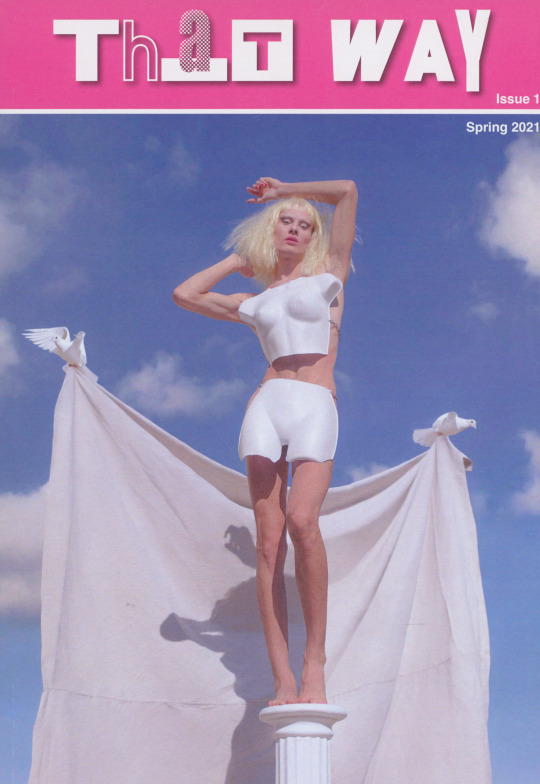
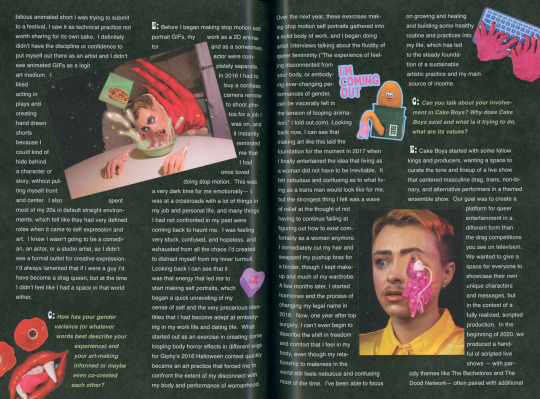

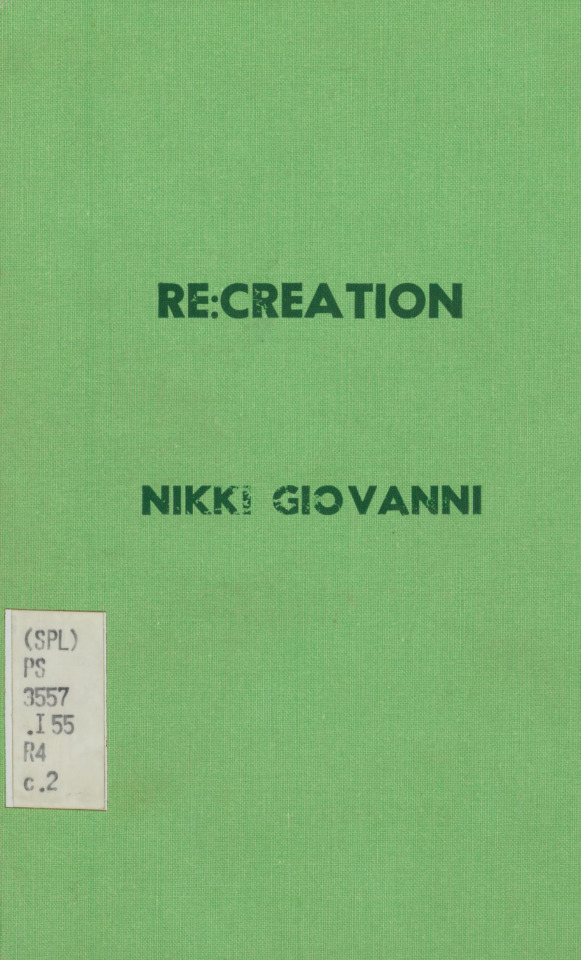
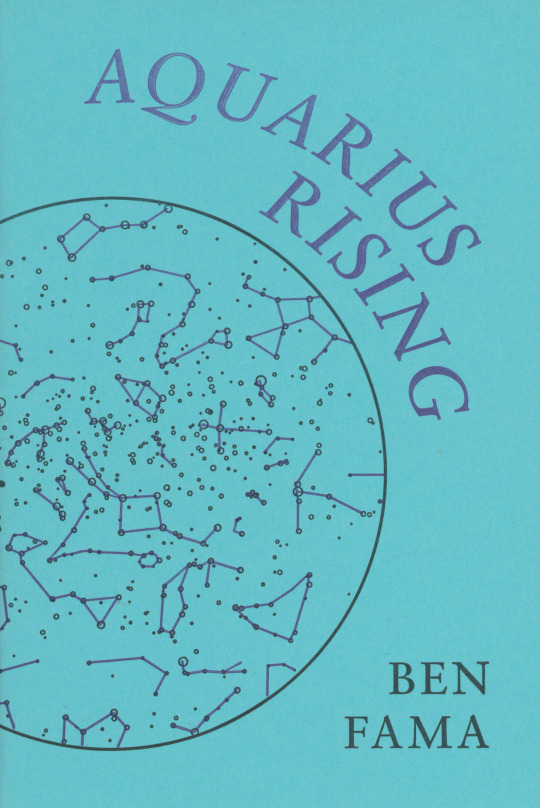
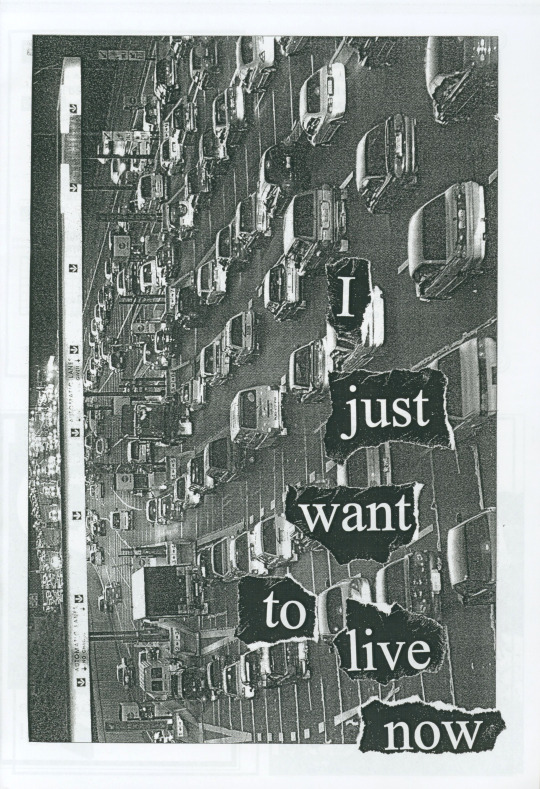
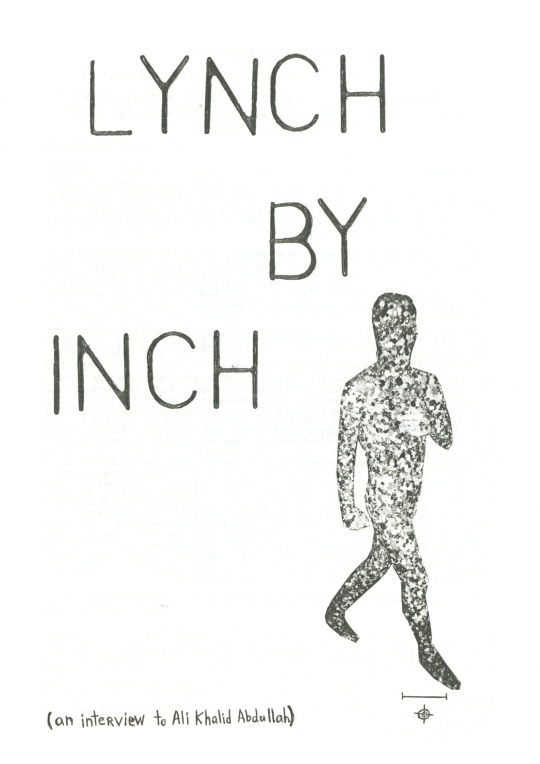
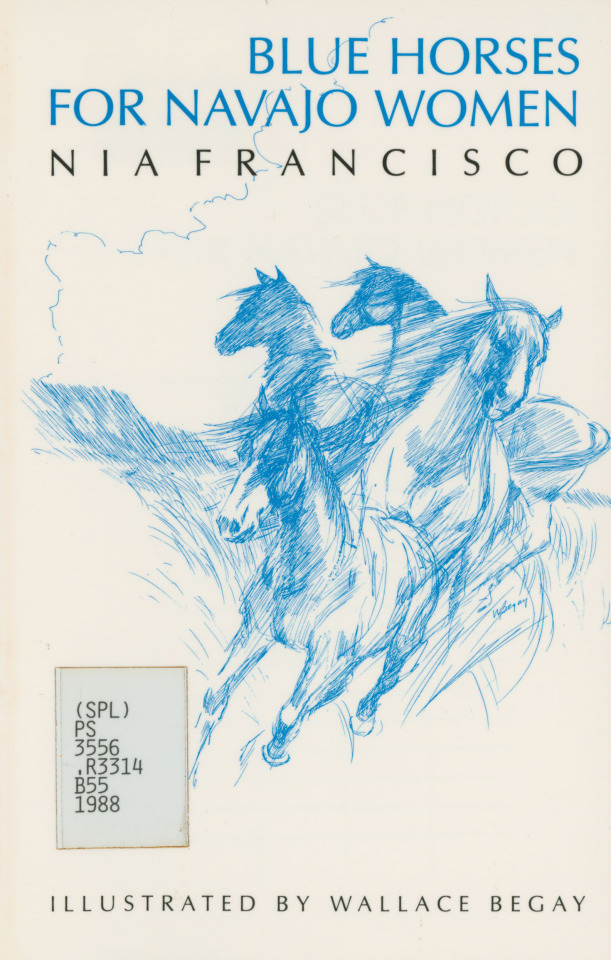
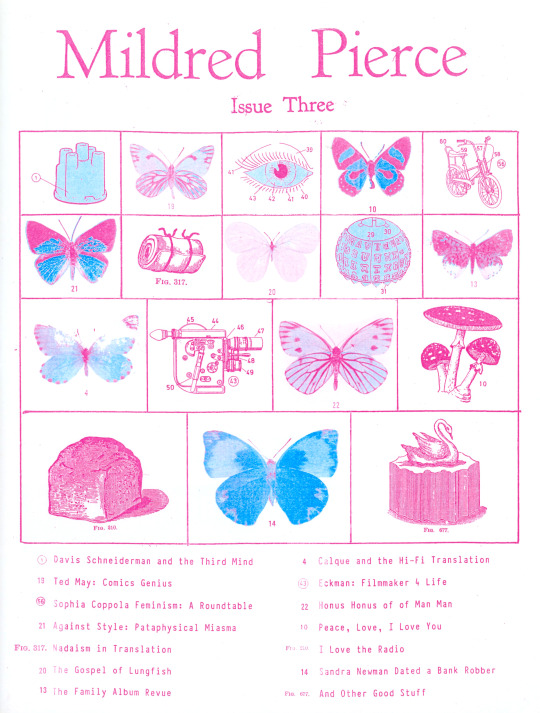

It's Feral Friday!
If Special Collections were compared to a National Park- a thoughtfully curated, accessible experience of the wilderness of the natural world- where would its edges lie? What would be considered off the beaten path, how would its boundaries be defined, and in what ways would the landscape beyond those boundaries inspire our imagination and broaden our conceptions of the world and our communicative capacities?
That’s the realm of pluralistic inquiry explored by Feral Fridays, a new weekly post where we’ll feature items from our collection like zines, experimental book arts, independently produced poetry and other unruly materials that exist at the margins of publishing and literary traditions.
Let’s get Feral!
--Ana, Special Collections Graduate Intern
Images:
That Way Issue 1, Spring 2021
That Way Issue 1, Spring 2021, pp. 23-24 (excerpt from interview w/Erma Fiend)
Thing Issue no. 3, Summer 1990
Re: Creation by Nikki Giovanni, Broadside Press, 1970
Aquarius Rising by Ben Fama, Ugly Duckling Presse, 2010
excerpt from Ugly Duckling Issue 6, October 2003
Lynch by Inch: an interview to Ali Khalid Abdullah 2003
Blue Horses for Navajo Women by Nia Francisco, Greenfield Review Press, 1988
Mildred Pierce Issue 3, April 2009
The Match! Number 97, Winter 2001-2002
#feral friday#feral#zines#chapbook#poetry#broadside press#greenfield review press#ugly duckling press#That Way#Thing#Ugly Duckling#Mildred Pierce#The Match!#special collections#ethical anarchism#native american poetry#indigenous american poetry#black poetry#african american poetry#queer lit#trans lit#lgbtq literature#feminist literature#Ana
48 notes
·
View notes
Text
"A person must be truly miserable if they lack the most essential things—or believe they do. Someone who is missing something crucial to no longer feel small. Someone who refuses to give because they claim everything for themselves; the poor unfortunate soul who knows nothing beyond their own desires."
— Jorge Bucay, Argentine author, psychiatrist, and Gestalt therapist
Excerpt from the book "Let Me Tell You a Story" (pp. 65f)
8 notes
·
View notes